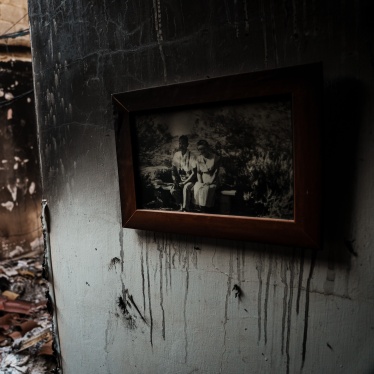A bedrock principle of the laws of war is that all warring parties, whether national armed forces or armed groups, must do everything they can to minimize harm to civilians. Deliberate attacks on civilians, but also attacks that don’t distinguish between civilians and combatants, are prohibited. International law seeks to limit civilian suffering and destruction.
Yet in Israel and Palestine, the last year has been defined by unlawful attacks on civilians, causing suffering on a horrifying scale.
Ahiad Ben Yitzchak, 29, was on Zikim Beach when Palestinian fighters, including from Hamas’ armed wing, landed in boats and killed at least 19 people there, among 815 civilians killed in southern Israel on October 7, 2023. “When people run for their lives, they fall, and they are screaming. And it’s an awful feeling I can’t describe.” About 251 people were taken hostage that day.
Mu’min al-Khalidi, 21, was sheltering with his family in northern Gaza City on December 21, when Israeli soldiers threw grenades and fired into the room, killing seven people. He regained consciousness under their bodies. “There are no words to describe what I felt. All I want to know is why? Why did I have to live through such a massacre? Why did I lose all these people? What did we do to deserve all this?”
Hostages in Gaza have been shot dead by their captors and subjected to inhumane treatment. Palestinians in Israeli detention facilities have been tortured, abused, held in incommunicado detention, and subjected to sexual violence.
The International Court of Justice in the Hague has ordered Israel three times to prevent genocide against Palestinians and let necessary aid enter Gaza. Yet the Israeli military has maintained its unlawful siege and repeatedly attacked hospitals and humanitarian workers.
As of September 2024, nearly 42,000 Palestinians had been killed in Gaza according to the Gaza Ministry of Health, the majority women and children. The number of those under the rubble and others who have died from starvation, illness, infection, and disease may be higher.
Almost all civilians in Gaza are displaced, with most crammed into an area that consists of just 3 percent of Gaza’s territory. Nearly all suffer from hunger. Children have no schools and face trauma. The majority of buildings are damaged or destroyed. Entire neighborhoods have been razed to the ground.
Ghazal, a 15-year-old girl with cerebral palsy, said she lost her assistive devices in an attack on her home in Gaza City on October 11 and begged her parents to leave her behind when they had to evacuate two days later following the Israeli military’s evacuation order: “I was a burden on them [my family], an extra load alongside their belongings. I couldn't find any means of transportation. I gave up and sat on the ground in the middle of the road, crying. I told them to go on without me.”
Victims of rights abuses in Israel and Palestine have faced a wall of impunity for decades. Israel’s policies of apartheid and persecution against Palestinians are worsening, including land grabs and deadly violence in the West Bank.
The International Criminal Court is now considering arrest warrants for several Israeli and Hamas leaders.
Some foreign governments say they are trying to end the abuses yet pour fuel on the fire, sending arms to warring parties that are committing widespread abuses. Foreign officials, including in the United States, who knowingly send weapons to an abusive force risk complicity in international crimes.
The recent escalation of hostilities across the Middle East is putting more civilians at risk. All civilians—in Israel, Palestine, and Lebanon—are entitled to protection, dignity, and justice.










